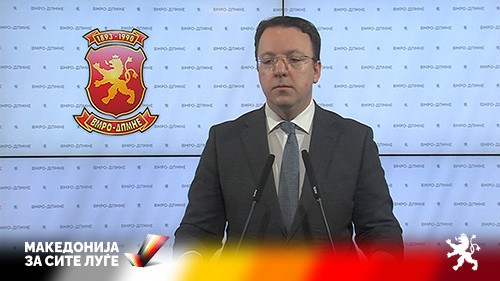Column by VMRO-DPMNE Vice President Aleksandar Nikoloski, on the dispute between Macedonia and Bulgaria
Over the years of blockade by Bulgaria for the start of EU membership negotiations, we’ve lacked a serious approach from the Macedonian side and a realistic view of the problem. The problem is not a daily political event, it is even less related to one or some of the political parties; it is not new, and there is almost no disagreement about it in Bulgaria. Bulgaria’s view of Macedonia and the Macedonians as a separate people and the Macedonian language as a separate language has not changed for decades. If we go deeper and read the Bulgarian history properly, we will easily come to the conclusion that the reasons that Bulgaria cites as an explanation for the veto on Macedonia are constant. A policy for which there is an absolute consensus and which has its roots in the founding of the Bulgarian state in 1878 and the events that took place before that as well as the founding of the Bulgarian Church – the Exarchate in 1870. That is why we need a real response from the Macedonian side, building a clear strategy, creating a broad social and political consensus around it and then firmly adhering to that national strategy. When SDSM realizes that the problem is not an issue of daily politics, then it will be easier to find solutions. That is why we propose to form a working group in which we will discuss and build the strategy. The space is small to explain all aspects of such a strategy, but I can only give one example.
In order for Macedonia to win this battle, it must strictly adhere to the arguments and to the established system of international law and institutions. One of the basic institutions for the protection of human rights is of course the European Court of Human Rights in Strasbourg. Macedonia must strictly adhere to it and demand unconditional compliance with court decisions. In the European Court, tens of thousands of citizens from all over Europe are seeking justice that they cannot find in domestic courts.
Macedonians from Bulgaria have been fighting for these rights for decades. They have always lived there and want to exercise their national, linguistic and cultural rights, but unfortunately Bulgaria refuses to do so. It refuses to register the associations of Macedonians through which they want to exercise their rights. You will agree that this is an undemocratic act of a member state of the European Union.
So far, there are a total of 14 judgments of the European Court of Human Rights concerning Macedonians in Bulgaria and so far none of them has been implemented. None! This is serious undermining of the court’s credibility and that is why Macedonia must demand that the Council of Europe acts.
I would like to highlight two of the 14 judgments of the European Court which for me in a very symbolic way show where Bulgaria is in this process. The first is the refusal to register a “MACEDONIAN CLUB FOR ETHNIC TOLERANCE IN BULGARIA”. What is disputable if a Macedonian club for ethnic tolerance is registered, when ethnic tolerance is the highest goal of the EU and the Council of Europe?
The second verdict refers to the registration of the “ASSOCIATION OF THE REPRESSED MACEDONIANS IN BULGARIA – VICTIMS OF COMMUNIST TERROR”. Communism has ruled in Bulgaria for 45 years and I see no reason for Bulgaria not to face its past and admit that there are victims of communist terror who, among other things, died because they were Macedonians.
It is no coincidence that the analysis of the Secretariat for Implementation of Judgments expresses deep concern that in recent registration procedures initiated by Macedonian applicants’ associations in Bulgaria, the institutions have again disregarded the principles set out in the Court’s judgments and the Interim Resolution of the Committee of Ministers. Macedonia must insist on the implementation of the verdicts and demand that all mechanisms be used against Bulgaria, and not to keep silent and put them under the rug.
Bulgaria is constantly blocking Macedonia on the European path, and at the same time Bulgaria is not respecting the rulings of the European Court of Human Rights. This is a hypocritical policy that we must insist on ending.
Macedonia should start negotiations for EU membership, and Bulgaria should ensure basic human and language rights to Macedonians in Bulgaria. Only such an approach can lead to good neighborly relations and friendly relations between the Macedonian and Bulgarian people.
This is just one example of what Macedonia’s national strategy towards Bulgaria should contain. I hope SDSM will be able to muster strength to do it together.





Comments are closed for this post.